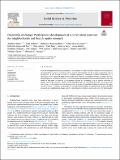Ownership of change: Participatory development of a novel latent construct for neighborhoods and health equity research
Author(s)
Binet, Andrew; Nidam, Yael; Houston-Read, Rebecca; Lopez, César Garcia; del Rio, Gabriela Zayas; Abreu, Dina; Baty, Carl; Baty, Arnetta; Genty, Josee; Graham, Goldean; Joseph, Jeff; Justice, Will; Roderigues, Gail; Underhill, David; Gavin, Vedette; Arcaya, Mariana C.; ... Show more Show less
DownloadPublished version (3.158Mb)
Publisher with Creative Commons License
Publisher with Creative Commons License
Creative Commons Attribution
Terms of use
Metadata
Show full item recordAbstract
Processes of neighborhood change are important determinants of health. One salient dimension of the experience of neighborhood changes is a person's evolving sense of empowerment over the changes around them, such as development of new housing or shifts in economic opportunity. Community residents collaborating on a Participatory Action Research study developed the novel construct "ownership of change" to capture this psychosocial process, and hypothesized that it may help explain the relationship between neighborhood change and health. In this paper, we describe our participatory process for developing a way to measure ownership of change, explore the construct's validity, test the hypothesis that it is associated with health, and analyze qualitative data to understand the process through which one's sense of ownership of change is produced. We argue that the construct is useful for studying the role of neighborhood changes in shaping health, and that building ownership over neighborhood change must be a key dimension of urban planning and policy for health equity.
Date issued
2022-09Department
Massachusetts Institute of Technology. Department of Urban Studies and PlanningJournal
Social Science & Medicine
Publisher
Elsevier BV
Citation
Binet, Andrew, Nidam, Yael, Houston-Read, Rebecca, Lopez, César Garcia, del Rio, Gabriela Zayas et al. 2022. "Ownership of change: Participatory development of a novel latent construct for neighborhoods and health equity research." Social Science & Medicine, 309.
Version: Final published version
ISSN
0277-9536